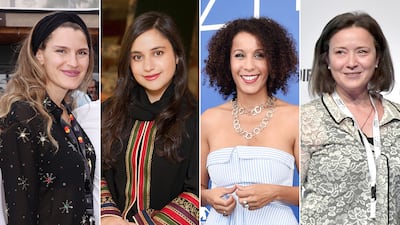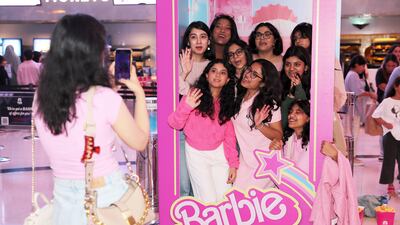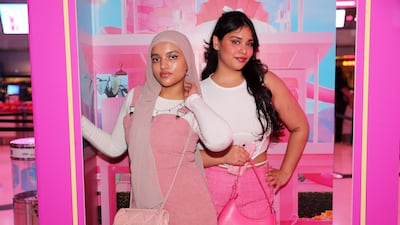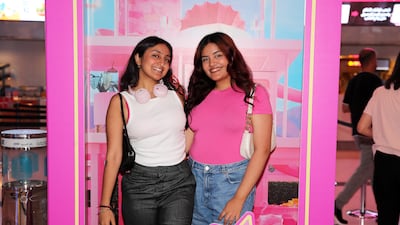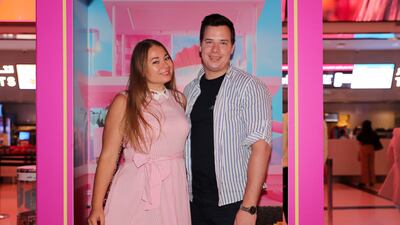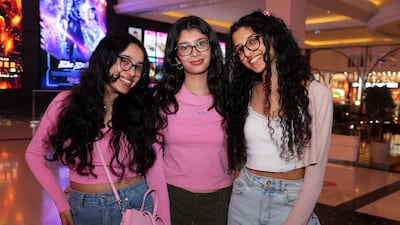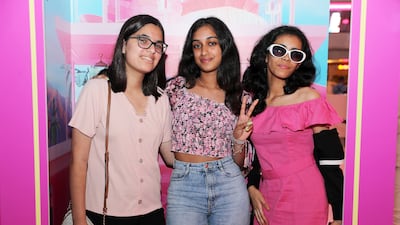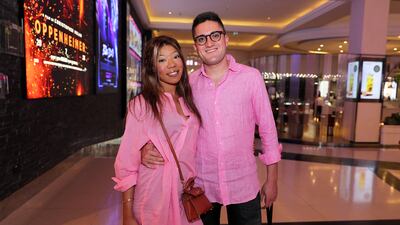The long wait for Barbie fans is finally over, as Greta Gerwig’s new film is out now in UAE and Saudi cinemas. Barbie has already notched up some impressive global records, becoming the first film directed by a female filmmaker to make $1 billion and the biggest-ever opening week to date for Warner Bros.
Apart from its financial impact, the movie has also become as much of a cultural phenomenon as the doll that inspired it – with some seeing it as opening doors for women in film, and others hailing it as a rebuke to patriarchy and materialism.
Yet, until now, the crucial voices of the Middle East's female filmmakers has been missing. The National reached out to find out what Barbie's success means to them.
Hassiba Freiha is an Emirati-Lebanese writer, director and actress whose debut feature Farah is available on Netflix. She admits that as a little girl she was a “huge fan of Barbie,” and even credits playing out the pretend life of her doll as a child with shaping her love of storytelling.
“Cinema really needed the shot in the arm of Barbenheimer,” Freiha tells The National, referencing the phenomenon, as people got excited about the simultaneous release of Barbie and Oppenheimer. “As a woman with Arab heritage, I feel excited for Arab women, because we have many women pushing boundaries and telling unique stories in a more thought-provoking way than they did decades ago.
“The commercial success of Barbie shows that the creative sectors are serious business, and I’m happy to see ‘her story’ come to life in such a relevant and intelligent way, encouraging other women to empower themselves the way we did with Barbies as young girls.”
Hana Kazim was the first Emirati graduate of the prestigious AFI Conservatory in LA. Her films have screened at international festivals such as FrightFest, and last year, she launched Abu Dhabi production house Wiswas Productions, which has several projects in the pipeline across the Arab world.
Kazim broadly agrees with Freiha’s assessment of Barbie as an inspiration for women filmmakers in the region: “I think it’s important for females to tell female stories, especially in a region where the world of females is very different and unique,” she says.
The director adds that the authentic voice provided by film is more crucial than ever in the AI age, and says she hopes the shifting gender balance in Hollywood will spread beyond the borders of Tinseltown: “My hope is that with the changing tides in the West, we find the opportunity here as filmmakers to contribute to this zeitgeist of our generation.”
For some, the idea that changing attitudes in the West could impact women filmmakers in the Middle East is problematic.
Imaginarium Films founder Rula Nasser established the Royal Film Commission of Jordan’s Filmmaker Support Programme, and has produced on more than 30 international features, including this year’s debut Jordanian Cannes feature selection, Inshallah a Boy, and 2021’s Saudi Oscar entry Scales.
Nasser has been following the cultural discourse around Barbie with interest. “As a woman today, I don’t see we resemble the Western movement, or that it works with our culture – our society’s problems with the women’s movement can’t be similar to the West,” she says. “Also, let’s not only hear from privileged women, who are not suffering like the unprivileged. The definitions of freedom might vary between them.”
Algerian director Sofia Djama’s debut feature, The Blessed, picked up three prizes at 2017’s Venice Film Festival, including the Lina Mangiacapre Award.
Djama was optimistic when she first heard Gerwig would direct Barbie. She says: “I was fascinated by the fact [a woman] had access to a colossal budget to make a film. It took me a bit of thinking to deconstruct that idea and stop wanting to celebrate."
However, that optimism was short lived. “Barbie isn't a feminist film. It's the illusion of a cause, marketed to sell rubbish." She says the notion that "this mega-advertising campaign could help give more space to women filmmakers" is "naive".
Like Nasser, Djama is unconvinced a Western interpretation of female empowerment is relevant to the Middle East and beyond: “The argument was ‘we need representation,’ but this isn’t representation,” she continues. “You're not building a new mindset for a little girl in Afghanistan. On the contrary, you’re giving the argument that things stay exactly the same.”
For Djama, Gerwig is not a beacon of feminist aspiration: “Greta simply proves that a woman can do as much harm as a man, and that women, like men, can choose hyper-capitalism and the promotion of consumerism in a world that is constantly sounding the alarm bell about over-consumption,” she concludes.
The film has certainly inspired strong feelings, and now UAE audiences can join the debate too. For Nasser, that can only be a good thing: “I am not sure how the film is supporting any female movement, but it’s always good to have a debate,” she says. “That’s why we have films.”
